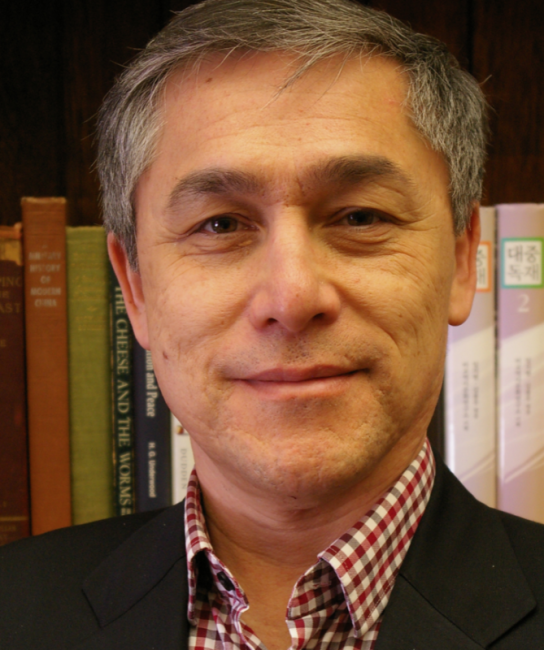You have /5 articles left.
Sign up for a free account or log in.

Charles Armstrong
Columbia University
Charles Armstrong, Korea Foundation Professor of Korean Studies in the Social Sciences at Columbia University, plagiarized parts of his award-winning book on North Korea, Tyranny of the Weak: North Korea and the World, 1950-1992. He’s currently on sabbatical and will retire at the end of 2020, the university told Armstrong’s colleagues this week.
“These findings were made in accordance with our policy, which required a confidential preliminary review by an inquiry committee, an investigation by a separate ad hoc faculty committee, oversight and recommendations by the university’s standing Committee on the Conduct of Research, and final decisions by the executive vice president for research and the provost,” Maya Tolstoy, dean of the Faculty of Arts and Sciences, wrote in an email to professors that was obtained by Inside Higher Ed.
Findings of research misconduct are generally “communicated to the public through retractions or corrections published in the scholarly literature,” Tolstoy wrote. “Where such a retraction is not feasible, the university may choose to notify the relevant community.”
Armstrong declined to comment.
But the findings certainly aren’t a surprise to him or many others who study North Korea. Talk of research misconduct has dogged Armstrong since 2016, when Balazs Szalontai, a professor of North Korean studies at Korea University, publicly accused Armstrong of fabricating dozens of citations in Tyranny of the Weak. His ultimate list of alleged instances of misconduct in the book numbered 90.
Szalontai said via email at the time that many factual details in Armstrong’s 2013 book, published by Cornell University Press, looked a lot those from his own 2006 book, Kim Il Sung in the Khrushchev Era: Soviet-DPRK Relations and the Roots of North Korean Despotism, 1953-1964, from Stanford University Press. And when Szalontai checked Armstrong’s cited Russian and East German archival sources, he said, he found that many of the documents didn’t exist. Armstrong’s claims were often incompatible with the content of documents that did exist, he also alleged.
“Since the date, type and content of the cited documents were nearly always identical with the analogous Hungarian documents I cited,” Szalontai said then, it’s “difficult to avoid the conclusion that these nonexistent sources were fabricated with the aim of concealing the multiple acts of intentional plagiarism.”
Szalontai posted online a table-style document with scores of examples of what he called plagiarism, source fabrication or serious “content distortion" in Tyranny of the Weak. He also reported Armstrong to Columbia.
Armstrong publicly responded to the plagiarism claims in 2017 on his now-defunct website, saying that he’d issued 52 corrections to the next edition of his book, set for that spring. “My skills in Russian are the weakest among the languages I used to research Tyranny of the Weak,” he wrote, “and in retrospect, this weakness contributed to some of the citation problems.” (The final number of corrections was closer to 70.)
In a number of cases, Armstrong said, “I examined the footnotes and bibliographies in secondary sources and tried to go directly to the sources cited, or find equivalent sources in collections to which I had access. The book’s narrative was constructed through multiple transfers of notes, some made by my research assistants and others done by myself. This too, in retrospect, may have resulted in some inaccuracies.”
But Szalontai said Armstrong’s explanations were selective and misleading. In one case, for example, Armstrong said that he erred in how he cited a document. But Szalontai said his concern was really about the discrepancy between the document’s “claimed and actual content.”
Cornell University Press, which published Tyranny of the Weak, said Thursday that the book had been taken out of print. It didn’t say when. The book is still available for purchase on Amazon.
Tyranny of the Weak was widely acclaimed, winning the American Historical Association’s John K. Fairbank Prize in East Asian History in 2014. The association announced in 2017 that after “careful review,” it identified a “set of citations that did not meet professional standards.” Armstrong reviewed his work and corrected the “citation errors,” it said at the time, but he still returned his prize out of respect for the association.
Columbia said in a statement that Armstrong had been found to have committed plagiarism in his book and that he’s no longer teaching or supervising students.
Szalontai said in a Facebook post this week that what’s been made public about the case represents “the tip of the iceberg” and that Armstrong is a serial plagiarizer. Via email, he said that the scale of the plagiarism was “virtually unparalleled in the field of Korean/East Asian studies.” Other academics also have been affected, he's said.
Michael V. Dougherty, Sr. Ruth Caspar Chair in Philosophy at Ohio Dominican University, has written about plagiarism and exposed many cases in the humanities. Made-up citations in published scholarship are rare, he said Thursday -- but not unheard-of. In 2002, for example, the independent historian A. D. Harvey published an article in The Dickensian citing fake sources about an encounter between Charles Dickens and Fyodor Dostoevsky (there is no real evidence that the two ever met). Harvey published under a female pseudonym, and the incident is remembered more as a hoax than plagiarism. But, more recently, Dougherty noted, a paper on e-government initiatives in Gambia, published by Government Information Quarterly, was accused of being based on irrelevant citations. The paper's authors responded here. The journal also responded.
In general, Dougherty said he’s more familiar with cases in which researches include references on their CVs to books and articles that don’t exist. An anthropologist in Holland, for example, was found by his university in 2013 to have made up least 61 papers and invented awards for his CV, Retraction Watch reported.





